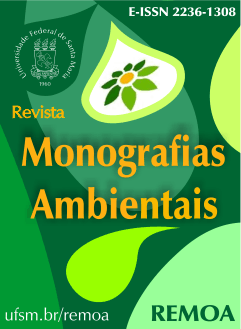Cálculo de índice orçamentário das instalações hidráulicas de uma construção, em função da área construída e do INCC
DOI:
https://doi.org/10.5902/2236130814055Keywords:
Budget, Budget worksheet, Cost, Index, Hydraulic installationsAbstract
The budget can be defined as the expected cost of a work (inputs and services) before its execution. To draw up a budget, it’s necessary to develop a sequence of consecutive tasks (to lift and meet deeply the spend of materials and services to be perform, the labor’s amount, the incidence of labor law, time of the equipaments, the financial and indirect administrative costs and the tax burden that will weigh on services. A budget can result in two opposing realities, when it is poorly designed, without defined criteria, it can causes damages, otherwise, it ensures profitability and the corporate survival. This study presents the index development derived from a spreadsheet budget that expresses the overall value for the execution of a plumbing work (results of compatibility between the quantity of materials and labour worksheet and unit cost spreadsheet) relative to its construction area. The project considered here is for comercial use, it has three floors an four offices for rental. This index makes possible to obtain a value close to estimate the real costs of a hydraulic system for a similar project, minimizing the execution budget time.
Downloads
References
AGÊNCIA GOIANA DE TRANSPORTES E OBRAS (AGETOP). Critérios e Normas para Orçamento de Obras Civis Utilizados pela Agetop. Goiânia, 2006.
ASSOCIAÇÃO BRASILEIRA DE NORMAS TÉCNICAS (ABNT). NBR 12721: Avaliação de Custos Unitários e Preparo de Orçamento de Construção para Incorporação de Edifício em Condomínio. Rio de Janeiro, 1999.
CORDEIRO, F. R. F. S. Orçamento e Controle de Custos na Construção Civil. Belo Horizonte, 2007, Monografia apresentada ao Curso de Especialização em Construção Civil da Escola de Engenharia UFMG.
LOPES, C. O; LIBRELOTTO, I. L; AVILA, A. V. Orçamento de Obras – Construção Civil. Santa Catarina, 2003.
MINICHIELLO, M. O. Qualidade no Orçamento do Custo Direto de Produção na Construção Civil. Florianópolis, 2007. Monografia apresentada ao Curso de Tecnologia em Gerenciamento de Obras de Edificações centro Federal de Educação Tecnológica de Santa Catarina – Unidade Florianópolis.
MORETHSON, F. S. Orçamento e custos da construção. São Paulo: Hermus, 1999.
MORIEL, E. RODRIGUES, C, A. Métodos orientativos para a utilização de índices de produtividade variável durante o processo de elaboração de orçamentos na construção civil. Barretos, 2008.
OTERO, J. A. Uso de Modelos Paramétricos em Estimativas de Custo para Construções de Edifícios. Pós-Graduação em Engenharia de Produção, Universidade Federal de Santa Catarina. Florianópolis, 2002.
VALENTINI, J. Metodologia para Elaboração de Orçamentos de Obras Civis. Monografia apresentada ao curso de Especialização em Construção Civil da Escola de Engenharia UFMG. Belo Horizonte, 2009.
Downloads
Published
How to Cite
Issue
Section
License
Ethical guidelines for journal publication
The REMOA is committed to ensuring ethics in publication and quality of articles.
Conformance to standards of ethical behavior is therefore expected of all parties involved: Authors, Editors, Reviewers, and the Publisher.
In particular,
Authors: Authors should present an objective discussion of the significance of research work as well as sufficient detail and references to permit others to replicate the experiments. Fraudulent or knowingly inaccurate statements constitute unethical behavior and are unacceptable. Review articles should also be objective, comprehensive, and accurate accounts of the state of the art. The authors should ensure that their work is entirely original works, and if the work and/or words of others have been used, this has been appropriately acknowledged. Plagiarism in all its forms constitutes unethical publishing behavior and is unacceptable. Submitting the same manuscript to more than one journal concurrently constitutes unethical publishing behavior and is unacceptable. Authors should not submit articles describing essentially the same research to more than one journal. The corresponding author should ensure that there is a full consensus of all co-authors in approving the final version of the paper and its submission for publication.
Editors: Editors should evaluate manuscripts exclusively on the basis of their academic merit. An editor must not use unpublished information in the editor's own research without the express written consent of the author. Editors should take reasonable responsive measures when ethical complaints have been presented concerning a submitted manuscript or published paper.
Reviewers: Any manuscripts received for review must be treated as confidential documents. Privileged information or ideas obtained through peer review must be kept confidential and not used for personal advantage. Reviews should be conducted objectively, and observations should be formulated clearly with supporting arguments, so that authors can use them for improving the paper. Any selected referee who feels unqualified to review the research reported in a manuscript or knows that its prompt review will be impossible should notify the editor and excuse himself from the review process. Reviewers should not consider manuscripts in which they have conflicts of interest resulting from competitive, collaborative, or other relationships or connections with any of the authors, companies, or institutions connected to the papers.






